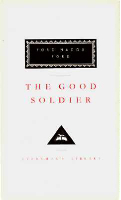Booktext, July 07--The Good Soldier

July 2007
Spotlight: The Good Soldier
Author: Ford Madox Ford
Year: 1915
Length: 300 pages (appx.)
Publisher: Oxford University Press (currently)
 When I was in college, The Good Soldier was assigned reading in only one class. None of my peers had read it. None of my friends in literature programs elsewhere had read it. Nobody had even heard of it. And yet, my professor held it up, proudly, on our first day of discussion, and said it was "the perfect novel."
When I was in college, The Good Soldier was assigned reading in only one class. None of my peers had read it. None of my friends in literature programs elsewhere had read it. Nobody had even heard of it. And yet, my professor held it up, proudly, on our first day of discussion, and said it was "the perfect novel."
Any disagreement I might have had was fleeting. Certainly it was well-dead and buried after my second reading. I've now lost count of how many times I've dusted my old copy off and brought it along with me. It's an excellent companion, The Good Soldier. It's a scrawny little friend of yours that means nobody any harm but can't seem to help but get picked on by the larger, more intimidating novels. The Good Soldier arrives like a tentative whisper and departs the same way, only maybe a bit more rapidly.
The Good Soldier is a tale told by an idiot. Our idiot, in this case, is John Dowell, an American living abroad who finds himself, and notably his wife, entangled in a complex social relationship with the English Ashburnhams. John Dowell tells us his story after everything has fallen apart...he stands alone, surveying the destruction around him...lamenting the loss of three good people...pitying himself for being the one left behind. And the fact that he is utterly incapable of communicating his story to us makes this book one of the most rewarding comic novels in history.
The book itself is Dowell's struggle to understand what has happened. Even in the midst of explaining something to us, he backtracks, corrects himself, rethinks something and asks you to ignore what he's just said as he no longer believes it himself. It isn't until his wife's funeral that he is told, matter-of-factly, that his wife was having an affair with Edward Ashburnham. Dowell is the last to know...which is significant, considering that this is the man through whom we are getting all of our details.
Edward Ashburnham is the Good Soldier of the title, though there's very little of the soldier about him and absolutely none of the good. His constant philandering and pound-foolishness keep his wife Leonora in a state of continuous internal panic. (On the outside, it should be mentioned, Leonora is calm, icy, unfazeable--she is one of the most perfectly rendered examples of realistic stolidity in all of literature, and it's impossible not to love her and hate her at once.) It is through Edward that our hapless John Dowell lives his life vicariously. Edward, after all, possesses Dowell's own wife Florence sexually. He is also married to Leonora, with whom Dowell has fallen more than a little bit in love. And it is Edward for whom young Nancy Rufford has fallen, though it is Dowell's subconscious desire to marry her himself.
The initial divide between John Dowell and Edward Ashburnham is great and obvious, but as the novel progresses one realizes it's a divide of ability more than of desire. Both characters are equally selfish...it's just that Edward has learned to succeed and get away with it, and Dowell has learned that success is beyond him. Dowell's lack of active extra-marital pursuit is more down to social impotence than any admirable restraint.
That said, it is Dowell, our narrator, who is left to shoulder the burdens of everyone else...who is left to make sense of what everyone is saying when they're trying not to say what is really on their mind. Death rears its head every single time someone in the novel tells the truth to (or finds out the truth about) another character, and the only moral Dowell can seem to extract from this continuum of destruction is "Never, under any circumstances, tell someone what you feel."
The joke--the entire joke of the novel--is on Dowell for not being able to express himself in his own narration. He's defeated from the outset by his own inability to understand the complexities of life and social interaction, and what could have been a quick cautionary tale becomes instead a protracted, hesitant, apologetic lament. Dowell forgets important scenes, can't remember what he's told us already, doesn't hear somebody's last words when he's the only one there to have heard them...even forgets to tell us about the suicide of a main character until after the novel has ended.
John Dowell is inept, ineffectual...a complete and total boob. And he ranks right up there with Holden Caulfield and Humbert Humbert as one of the best first-person narrators of all time. (Though, obviously, for a very unique reason.)
![]()
Papercuts:
Lincoln, Gore Vidal (1984, 600 pages, appx.)
One of Vidal's "Novels of Empire," and the only one I've read, Lincoln is an interestingly-structured book. Unfamiliar with Vidal otherwise it's impossible for me to say whether it is a common mechanism of his or just one peculiar to this novel, but Lincoln is told almost exclusively in dialogue.
Abraham Lincoln's presidency, as we all know, was very much a presidency of action, what with a civil war to win, a nation to hold together, slaves to free, and, eventually, an assassination to endure. But Vidal spends very little time on descriptions of these events, at least in terms of the narration. Everything we know of these situations is overheard in the telling of one character from another. While it's an interesting way of giving the book an immediate and conversational identity, it also gives it an overwhelming feeling of sameness from beginning to end.
Dialogue only holds my interest for so long--it is, after all, just one of many story-telling possibilities up an author's sleeve. Vidal is not incapable of descriptive writing, but he sure is stingy with it here.
![]()
Stargirl, Jerry Spinelli (2000, 175 pages, appx.)
I have a certain affinity for children's literature and programming. I don't really know why...certainly nostalgia is a big part of it, but I think it's also a protective instinct of mine: the desire to make sure children are still in good hands. I remember Stargirl not from my own childhood, but from back when I used to substitute teach in my old school district. I didn't read it then...but found it in a second-hand shop for $1 and figured I'd check in on what the kids were being forced to read nowadays.
It's actually not half-bad for young-adult literature. It's subject to all the trappings of the genre (simplified descriptions, unexplained character relationships, infatuation with present-day [ie: transient] conventions) but it handles the bulk of itself quite well. The story isn't anything too original (a very strange student appears one day and turns the whole classroom dynamic on its ear...!) but it actually sets out in a rather brave directon: rather than Stargirl leading everyone else down the path to individuality, the core of the novel is actually Stargirl's forced homogenization into faceless drone. Think of it as One Flew Over the Cuckoo's Nest for preteens and you'll get an idea of not only the theme, but the relatively high quality.
![]()
About this entry
- By Phil Reed
- Posted on Wednesday, July 04 2007 @ 7:21 pm
- Categorised in Books
- 3 comments

I'd heard of Ford Madox Ford before, through a book review included in a collection of works by Dorothy Parker, but because I'm lazy and a horrible human being, I never did seek any of his work out.
I intend to rectify this error the next time I'm at the library. (The book thing, not the whole "terrible human being" thing. I seem to get so many good book recommendations off this site...)
By Arlene Rimmer BSc, SSc
July 05, 2007 @ 3:08 pm
reply / #
>I never did seek any of his work out.
I've read this and Parade's End...and those two books are as different from each other as you can ever imagine. Parade's End is of a high enough quality to warrant a recommendation, but it takes him about 1,000 to be about half as impressive as he was in The Good Soldier, at 1/3 of the length. Also, from what I understand, The Good Soldier is about the only time Ford let his humorous side run wild. Which is ironic, as its content is decidedly more morbid than you'll find in his other works.
The Good Soldier is a structural masterpiece. It's not my all-time favorite or anything, but it's pretty near flawless. It not only does everything a novel should do, it does everything I WANT a novel to do, as well.
>I seem to get so many good book recommendations off this site...
Unless I'm misreading that, thanks! I don't intend for anyone to read every book I recommend, but I'd at least like to provide a pool of Phil-Reed-Guaranteed novels that one can't go wrong with, so that eventually someone can say, "Hey, I'm really in the mood to read something..." and not have to end up with an Audrey Niffenegger novel.
By Philip J Reed, VSc
July 06, 2007 @ 12:33 am
reply / #
For what it's worth, Dorothy Parker also thought that The Good Soldier was Ford Madox Ford's best work--she even said so in a review of another Ford book entirely.
Really, I just sort of keep on the lookout for book recommendations, and this site has led me to a few notable successes (the works of Philip K. Dick and the League of Extraordinary Gentlemen being two that leap to mind immediately--I'm sure I could come up with more with some thought).
By Arlene Rimmer BSc, SSc
July 07, 2007 @ 11:28 am
reply / #